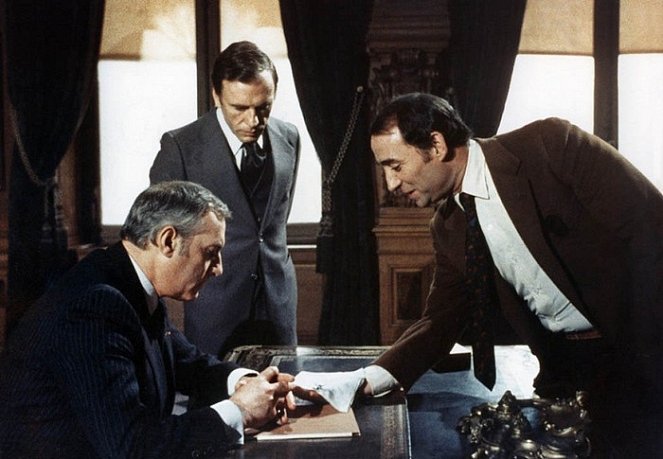Regie:
Christian de ChalongeKamera:
Jean-Louis PicavetMusik:
Patrice MestralBesetzung:
Jean-Louis Trintignant, Catherine Deneuve, Claude Brasseur, Michel Serrault, Umberto Orsini, Gérard Séty, Juliet Berto, Raymond Bussières (mehr)Inhalte(1)
Als Henri Rainiers Arbeitgeber, eine vornehme Bank, in einen Finanzskandal verwickelt wird, macht man den Prokuristen dafür zum Sündenbock. Doch Henri wehrt sich. Henri Rainier arbeitet bei einer angesehenen und vornehmen Pariser Bank im Vorstand. Im Glauben, seine Vorgesetzten seien damit einverstanden, gewährt er dem abenteuerlustigen Investor Chevalier d’Aven einen immensen Kredit. Doch das Geschäft des Hochstaplers erweist sich als betrügerische und katastrophale Investition. Es stellt sich heraus, dass Chevaliers Kredit die Bank viel Geld kostet, sodass zahlreiche Kleinanleger ihr Erspartes verlieren. Um einen Finanzskandal zu vermeiden, beschließt man daher die hohen Defizite zu vertuschen und Henri die alleinige Schuld zuzuschieben. Der Prokurist wird kurzerhand fristlos entlassen. Mit der Kündigung, die publik wird, fällt es Henri allerdings schwer einen neuen Job zu finden, denn niemand glaubt ihm, dass der Bankdirektor Miremont selbst für die Millionenpleite verantwortlich ist. Unterstützt von seiner Frau Céline stellt Henri Nachforschungen an, um seine Unschuld zu beweisen. Dabei stößt er auf fragwürdige Transaktionen und beginnt die Kehrseite der vornehmen und angesehenen Bank zu entdecken. Mit seinem Fund ist er bereit, das Geldinstitut zur Strecke zu bringen, egal was es kostet. (arte)
(mehr)Kritiken (1)
Other People's Money is evidence that as a species, we evolve slowly and basically solve the same problems as the ancient Romans or Greeks did. This means that our greed and pettiness have definitely not changed for the better. The ability of bank managers to find loopholes in the system to exploit small savers is undoubtedly not an invention of the 21st century or the Czech path of privatization of the national economy. Mechanisms of a social system based on the accumulation of wealth work universally. However, in Western society, they have to pay more attention to public opinion. One of the most prominent French actors of the second half of the 20th century, Jean-Louis Trintignant, practically never steps out of the frame and is a reliable pillar of support for the film. It is also a pleasure to watch his co-star Serrault in the role of a banker who doesn't want to lose at any cost. I find it interesting that Serrault is primarily perceived as a comedian, even though his ambiguous or outright negative roles in dramas seem much more significant to me. The film cannot be denied its impact and atmosphere in certain passages - among all, I would choose the scenes from the personnel agency, which with its psychological pressure can corner job applicants and rob them of their dignity. Unfortunately, the strong moments are balanced out negatively by scenes that I perceive as naive and lacking a sense of reality. For example, the part when a group of top managers cannot figure out what to do with an employee who locked himself in the archive and personally try to talk him out of his actions all night. Catherine Deneuve, unlike many professional models trying their luck in the world of cinema, is not awkward in her acting, but I don't feel that she serves the film as anything more than a charming decoration. Overall impression: 65%.
()

